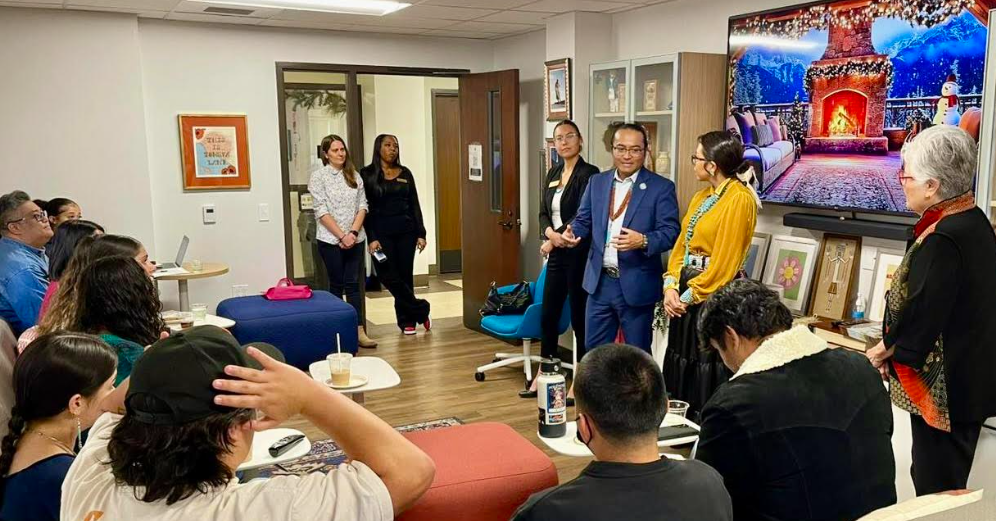
- Details
- By Native News Online Staff
Navajo Nation President Buu Nygren highlighted the importance of Navajo language and history during a visit to his alma mater, the University of Southern California, where he participated in a children’s book reading event.
Joined by First Lady Jasmine Blackwater-Nygren, President Nygren attended the USC Rossier School of Education’s monthly book club as part of November’s Native American Heritage Month. The event focused on the role of education in preserving Navajo culture and language.
The book club featured Dzani Yazhi Naazbaa': Little Woman Warrior Who Came Home, an emotional historical children’s novel by the late Dr. Evangeline Parsons Yazzie. The story recounts the harrowing journey of a young Navajo girl and her family, who were forcibly marched 450 miles from Black Mesa to the Bosque Redondo internment camp during the Long Walk of 1864. Written for children in grades 1–6, the book has resonated with audiences of all ages for its powerful storytelling.
“It’s intense,” President Nygren said of the book. “It might even be better for an older audience, but it’s a story everyone should know.”
He said hearing the story in Navajo made it more meaningful for him, accentuating the importance of preserving the Navajo language.
“The people who signed the Treaty of 1868 knew no English,” he said. “Sharing this story in our language honors their resilience and ensures our ancestors' experiences are remembered.”
The President and First Lady were welcomed by USC Rossier School of Education Dean Pedro Noguera. Both are avid readers of Navajo language children’s books to their two pre-school daughters.
“Language is not just about culture,” Dean Noguera said. “It’s about knowledge. When we lose a language, we lose a way of understanding the world.”
First Lady Blackwater-Nygren echoed these sentiments, highlighting the vital role of Navajo language immersion programs. She acknowledged the historical traumas faced by Navajo people, such as the boarding school era, where children were often punished for speaking their native language.
“While it’s important to share these stories, we also need to teach resilience and pride in our heritage,” she said.
President Nygren expressed deep concern about the declining use of the Navajo language, noting that while nearly half of Navajo people speak it, the number is decreasing with each generation. His administration has made language preservation a priority. To illustrate its significance, he read excerpts from Little Woman Warrior in Navajo, connecting the audience to the language and its historical roots.
He also emphasized the importance of creating resources like Native American centers at universities to support Indigenous students academically and culturally.
The featured author, Dr. Evangeline Parsons Yazzie, was a longtime professor of Navajo language at Northern Arizona University and an acclaimed writer dedicated to preserving Navajo heritage. Her textbook Rediscovering the Navajo Language was the first American Indian language book adopted by a state education department and remains a cornerstone of Navajo language education.
Dr. Yazzie’s literary contributions earned her numerous accolades, including the International Reading Association Children’s Choices Book Award and the Independent Publisher Book Awards for Non-fiction. Her work continues to inspire efforts to maintain and celebrate Navajo culture and language.
More Stories Like This
Native News Weekly (August 25, 2024): D.C. BriefsUS Presidents in Their Own Words Concerning American Indians
Indigenous Actor Elaine Miles Reports Detention by Alleged ICE Agents
Happy Thanksgiving from Native News Online
Coming Up on Native Bidaské: Behind the Animation: Joey Clift Talks “Pow” and Native Storytelling
Help us tell the stories that could save Native languages and food traditions
At a critical moment for Indian Country, Native News Online is embarking on our most ambitious reporting project yet: "Cultivating Culture," a three-year investigation into two forces shaping Native community survival—food sovereignty and language revitalization.
The devastating impact of COVID-19 accelerated the loss of Native elders and with them, irreplaceable cultural knowledge. Yet across tribal communities, innovative leaders are fighting back, reclaiming traditional food systems and breathing new life into Native languages. These aren't just cultural preservation efforts—they're powerful pathways to community health, healing, and resilience.
Our dedicated reporting team will spend three years documenting these stories through on-the-ground reporting in 18 tribal communities, producing over 200 in-depth stories, 18 podcast episodes, and multimedia content that amplifies Indigenous voices. We'll show policymakers, funders, and allies how cultural restoration directly impacts physical and mental wellness while celebrating successful models of sovereignty and self-determination.
This isn't corporate media parachuting into Indian Country for a quick story. This is sustained, relationship-based journalism by Native reporters who understand these communities. It's "Warrior Journalism"—fearless reporting that serves the 5.5 million readers who depend on us for news that mainstream media often ignores.
We need your help right now. While we've secured partial funding, we're still $450,000 short of our three-year budget. Our immediate goal is $25,000 this month to keep this critical work moving forward—funding reporter salaries, travel to remote communities, photography, and the deep reporting these stories deserve.
Every dollar directly supports Indigenous journalists telling Indigenous stories. Whether it's $5 or $50, your contribution ensures these vital narratives of resilience, innovation, and hope don't disappear into silence.
 The stakes couldn't be higher. Native languages are being lost at an alarming rate. Food insecurity plagues many tribal communities. But solutions are emerging, and these stories need to be told.
The stakes couldn't be higher. Native languages are being lost at an alarming rate. Food insecurity plagues many tribal communities. But solutions are emerging, and these stories need to be told.
Support independent Native journalism. Fund the stories that matter.
Levi Rickert (Potawatomi), Editor & Publisher

